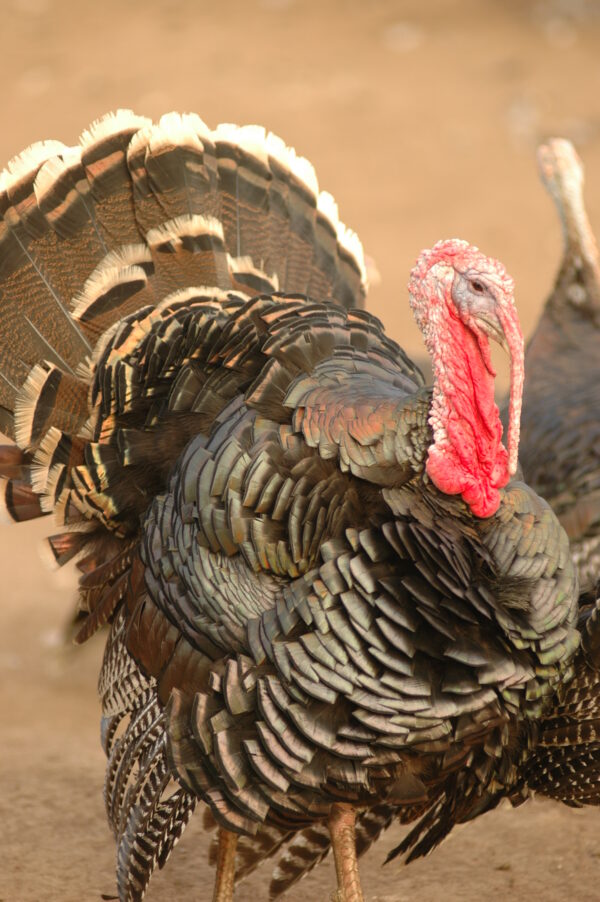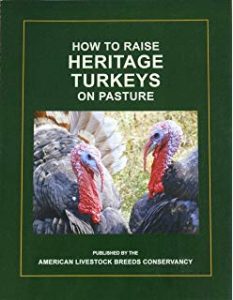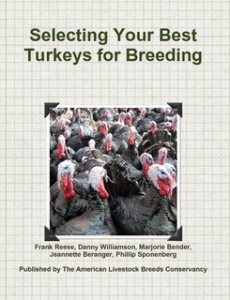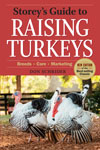 |
Breed Facts
Status:
Watch
Use:
Meat
Egg Color:
Pale cream to medium brown with spotting
Egg Size:
Large
Market Weight:
Male Young – 25 lbs. Mature 35-38 lbs.
Female Young – 16 lbs. Mature 18-22 lbs.
Temperament:
Highly dependent on socialization and selection by breeder; some select for aggressive, others docile
Characteristics:
Too large to fly. Active foragers. Like people.
STANDARD BRONZE TURKEY
The Standard Bronze has been the most popular turkey variety for most of American history. It originated from crosses between the domestic turkeys brought by European colonists to the Americas and the eastern wild turkeys they found upon their arrival. The hybrid vigor of this cross resulted in larger and more vigorous turkey stocks than European birds. These birds were also much tamer than wild turkeys. The coppery, bronze-colored metallic sheen, which gives the variety its name, was part of the inheritance from its wild ancestors.
Bronze-type turkeys were known by the late 1700s, but the name “Bronze” did not formally appear until the 1830s. Throughout the 1800s, breeders standardized the Bronze, and occasional crosses were made back to the wild turkey. The Bronze variety was recognized by the American Poultry Association in 1874.
The status of this variety has changed dramatically during the past century. In the early 1900s, a broader breasted Bronze turkey was introduced from England into Canada, and then into the northwestern United States. These were crossed with larger, faster-growing U.S. stocks, and the resulting bird, the Broad Breasted Bronze, became the commercial variety of choice. Further selection improved meat production, especially that of breast meat, growth rate, and other performance qualities. At the same time, changes in conformation, especially the shortening of the legs and the keel, nearly eliminated their ability to mate naturally. For this reason, most Broad Breasted Bronze turkeys have been artificially inseminated since the 1960s. Beginning in the 1960s the Broad Breasted Bronze was replaced by the Broad Breasted White turkey. Processors favored the white-feathered variety because it produced a cleaner-looking carcass. Today, the Broad Breasted Bronze is no longer used by the turkey industry, but it is promoted for seasonal, small-scale production.
Naturally mating, long-lived, slow-growing strains of Bronze turkeys, known as the Standard Bronze, have been left even further behind by the turkey industry. A few tenacious breeders maintained small flocks, participating in poultry shows, and raising a few for family and friends. The Bronze was not used for commercial production for decades until the early 21st century, when renewed interest in biological fitness, survivability, and superior flavor captured consumer interest and created a growing market niche.
The Bronze variety is stately and imposing in appearance. The standard weight for young toms is 25 pounds and 16 pounds for young hens. Since, however, the Standard Bronze has not been selected for production attributes, including weight gain for years; so many birds may be smaller than the standard. Careful selection for good health, ability to mate naturally, and production attributes will return this variety to its former stature. Broad Breasted Bronze turkeys are also in need of conservation. Only a few hatcheries maintain breeding flocks, and many of these are reducing their number. Marketing strategies need to be developed for each type that does not undermine the other.
Did you know:
The Conservation Priority List is organized historically. Breeds originating in North America are listed first, followed by those imported before 1900 and those that came
to our shores later. Many of these breeds were founded in the United States. That means we have a special responsibility for their conservation. You can invest in living history for as little as $4 per month. Click here to become a Conservation Champion today!
You may be interested in…
 |
Breed Facts
Status:
Watch
Use:
Meat
Egg Color:
Pale cream to medium brown with spotting
Egg Size:
Large
Market Weight:
16 -25 lbs
Temperament:
Highly dependent on selection by breeder, Some select for aggressive, others docile
You may be interested in…




